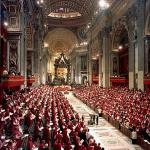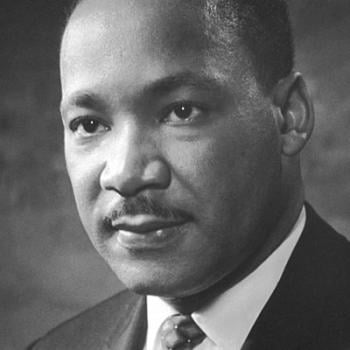A Good Witch Is hard to Find
In college, I was assigned Flannery O’Connor’s story “A Good Man Is hard to Find.” I was disdainful of modern literature at that time and initially reacted badly to this dark tale of banality and murder. I saw it as typical modern secular nihilism. (Yes, I was very obnoxious.) But one of my professors happened to be a Flannery O’Connor scholar, and with his help I came to see that O’Connor was after something deeper than I thought. She wasn’t just reveling in darkness for its own sake. She was using the depths of evil to which humans can descend to illustrate the drama of the human encounter with grace. I discovered that there were a number of 20th-century Catholic novelists who did this kind of thing, if not always as starkly as O’Connor: Waugh, Greene, Percy. . . . As with many young evangelicals, I found that these authors had a deeper understanding of human nature than the paradigm I’d grown up with had room for. They were willing to imagine the workings of grace in the darkest corners of the human spirit. And that played a role in my eventual decision to become Catholic, as it has for many others.
Now I have found a new author to add to this pantheon of Catholic writers–well, new to me. more or less. Gregory Maguire’s novel Wicked is best known as the inspiration for the hit musical. I’ve been meaning to read the novel for some years and finally managed it recently. I had started a few years ago but, like many people, had found it a bit hard to get into. While it’s imaginative, it’s also dark and extremely strange. The musical cleans things up a great deal and tells a much more “feel-good” story. (For one thing, Elphaba doesn’t fake her death in the novel, though there’s some question as to whether she’s really “gone for good.”)
It becomes clear pretty early on in the book that religion is going to be a major theme. I suspected that Maguire was a lapsed Catholic who was using the tropes of Catholicism for imaginative purposes. As the book went on, it became clear that he was doing more than that. Elphaba’s spiritual uncertainties and her ambivalent relationship with the divine are key to her character. But then, shortly before I reached the end of the book, I found out that Maguire is in fact a practicing Catholic. And that transformed my understanding of what he was up to. I believe that Maguire is doing something very similar to O’Connor and Waugh and Greene and Percy. He’s depicting the drama of salvation, and he’s willing to go deep and dark in order to do it.
The Soul of a Witch
The novel, like the musical, is the story of the Wizard of Oz told from the point of view of the Wicked Witch of the West, Elphaba. What’s striking, though, is that Elphaba doesn’t get a point of view until p. 224 of a 406-page book, after the central event of the book, the murder of her lover Fiyero by the Wizard’s henchmen. After seven years in a mauntery (convent), she sets out on a pilgrimage to the West, Fiyero’s homeland, to seek forgiveness from his wife. On the journey, she begins to identify as a witch and it’s only as a witch that she develops an inner life.
In the first half of the book, Elphaba is consistently shown as other people see her. Early on, she’s shown from her parents’ perspective as a strange, even monstrous child with green coloring and precociously sharp teeth. Then, as the action shifts to Shiz University (where the musical begins), she’s shown from the point of view of either Galinda/Glinda or Boq, her fellow students. Through their eyes, she appears as a sympathetic figure–sharply intelligent, prickly, definitely “neurodivergent” to use a term that has become common since the publication of the book. She inspires her friends to help her in doing research to support Dr. Dillamond’s theories about the fundamental kinship of Animals (sentient, talking animals) and humans.
When Dr. Dillamond, who is himself a Goat, is murdered (somewhat different from his fate in the musical), Elphaba drags Glinda off to the Emerald City to confront the Wizard about the growing persecution of Animals. Where the musical gives Elphaba the great song “Defying Gravity” as an Act I finale, the book has Elphaba hurriedly tell Glinda that she is not returning to Shiz with her but is staying in the Emerald City to fight the Wizard. The next section of the book describes Elphaba from the point of view of the Vinkus (“Winkie”) prince Fiyero, who had been part of her circle of friends at university but hadn’t been particularly close to her. Several years after her parting from Glinda, Fiyero spots her praying in a chapel of St. Glinda and follows her. They eventually become lovers, and argue about the ethics of Elphaba’s revolutionary activities and whether she has a soul. She insists that she has no soul and indeed no “self,” while he points out that she is “the most individual, the most separate, the most real.” She takes this to refer to her odd appearance, but clearly he, and others who encounter her during the first half of the book, mean much more than that.
An Atheist in Oz
Elphaba’s denial of a soul is a rejection of her religious upbringing. Her father, Frex, is a “unionist minister,” a clergyman of the official religion of Oz, which is a kind of “Catholicism without Jesus” like many fantasy religions. It worships an “Unnamed God” and also venerates a wide range of saints. It has a complex relationship with an older “paganism” centered on the Fairy Lurline, a mythological figure who allegedly founded the ruling (pre-Wizard) dynasty of Oz. (Somewhat like the role of Amaterasu in Shinto.) Unionism looks askance at Lurlinism but has incorporated many elements of the older faith, and many people practice Lurlinism as a kind of folk religion. There is also a more modern “pleasure faith” involving magic and sex, though this also has ancient roots in legends of the “Kumbric Witches.”
In other words, Maguire’s Oz, unlike Baum’s, is a deeply religious place. Elphaba stands out, in the first half of the book, for her steadfast rejection of religion, which goes along with her skepticism about a soul or indeed any kind of meaningful interior self. She defines herself solely by her odd appearance and her difference from others, even as she makes an impression of striking individuality on everyone she meets.
Who’s the Real Relativist?
Elphaba is also skeptical about conventional accounts of morality. One of the central questions of the book, often asked and never answered, concerns the nature of evil. This was Maguire’s starting point for the novel. At the time of the First Gulf War, when G. H. W. Bush was urging war against Saddam Hussein on the grounds that Hussein was “evil,” Maguire decided to write a novel exploring the nature of evil. The simplistic way to describe the book, which a lot of reviews fall into, is as a manifesto of moral relativism. The original Oz books present the Witch as simply “evil” with no need for further explanation. Indeed, the Oz books repeatedly tell the reader that certain characters are good or evil without much regard to what they actually do.
In one of the most famous lines of the original book and movie, Dorothy tells the Wizard (with good reason given his admittedly fraudulent and manipulative behavior) “you are a very bad man,” and he responds: “no, my dear, I’m a very good man, but I’m a very bad wizard.” We are expected to take his word for it, just as we are expected to take his word that the Witch is “wicked.” Maguire’s novel sets out to question this arbitrary, authority-based conception of good and evil.
By the end of the book, Elphaba has become someone recognizable as the “Wicked Witch” of the original book and film. She commits a number of cruel acts and does, in fact, attempt to kill Dorothy. Paradoxically, she begins turning into the “Wicked Witch” precisely at the point where the novel gives her an interior voice and where she begins to question her earlier assumption that she has no soul.
Manifest Destiny in Oz
If Elphaba is morally ambiguous, the Wizard is not. He’s unequivocally evil. And he’s pretty clearly a representative of American imperialism. As in the original story, he comes from late 19th-century America to Oz, but in Maguire’s version he does so in quest of a magical book, the Grimmerie, which has been hidden in Oz by another wizard from our world to hide it from people who would use its power for evil purposes. Elphaba begins to come into her powers in the second half of the book, in part because of her discovery of the Grimmerie in Fiyero’s castle where she lives as the guest of Fiyero’s widow. At the end of the book, Elphaba is revealed to be, in fact, the Wizard’s daughter. Insofar as she is “evil,” the Wizard would seem to be the source of her evil.
When Elphaba confronts the Wizard about half-way through the book, she describes the growing persecution of Animals as “immoral.” The Wizard responds: “I do not listen when anyone uses the word immoral. . . In the young it is ridiculous, in the old it is sententious and reactionary. . . In the middle-aged. . . it is hypocritical.” How then, Elphaba asks, can one call something “wrong” without using the word “immoral”? The Wizard answers, “try mysterious and then relax a little. The thing is, my green girlie, it is not for a girl, or a student, or a citizen to assess what is wrong. This is the job of leaders, and why we exist.” (175) The true champion of relativism, in this book, is the Wizard.
The Unnamed Goddess?
Dorothy, on the other hand, is the same innocent, fundamentally good character she is in the original Oz books. While the Witch repeatedly pours scorn on this innocence and claims to find her nauseating, there are plenty of indications that this has to do with Elphaba’s own pain and scars. She admits at one point that she sees in Dorothy her younger self. She wants to despise her because she can’t stand to face her own loss of innocence.
As the Witch awaits Dorothy’s arrival, her son Liir asks what she wants. She wants to say “forgiveness” but can’t bring herself to say it to him, since the thing she wants forgiveness for is having had an affair with his father Fiyero and unintentionally bringing about Fiyero’s death. In a kind of Freudian slip, she winds up saying, “a soul.” She then reflects: “A person who doesn’t believe in the Unnamed God, or anything else, can’t believe in a soul.” She speculates that religion may be a sort of necessary parasite–“the necessary evil” without which people would collapse: “The history of peoples who have shucked off religion isn’t an especially persuasive argument for living without it.” . . . “There may be no real city in the clouds, but dreaming of it can enliven the spirit.” (387)
Then follows the most explicit gesture toward Christianity in the book (still part of Elphaba’s internal monologue):
In our age’s generous attempt at unionism, allowing all devotional urges life and breath under the canopy of the Unnamed God, perhaps we have sealed our own doom. Perhaps it’s time to name the Unnamed God, even feebly and in our own wicked image, that we may at least survive under the illusion of an authority that could care for us. For whittle away from the Unnamed God anything approximating character, and what have you got? A big hollow wind. And wind may have gale force but it may not have moral force; and a voice in a whirlwind is a carnival barker’s trick. [She then reflects on the greater appeal of the older “paganism” that worshiped the fairy Lurlina who flew around in a chariot and visited people personally.] The Unnamed God, by virtue of its anonymity, can’t ever be suspected of a surprise visit. And would we recognize the Unnamed God if it knocked on our doors?”
Gambling on baptism
Elphaba’s friend Boq (who is not the Tin Woodman as in the musical) has already suggested to her that Dorothy seems like a kind of “unnamed Goddess” (360), but Elphaba scorns the idea of “savior children.” But the narrative seems to be suggesting that Elphaba is wrong to do so. Dorothy enrages Elphaba by asking her forgiveness for accidentally killing her sister, the “Wicked Witch of the East.” Elphaba has never received forgiveness, and she cannot give it. She has just admitted accidentally to Liir that she wants a soul, but now she refuses to accept the possibility that she may find her soul through meeting Dorothy: “You’re my soul come scavenging for me. I won’t have it … I won’t have a soul; with a soul there is everlastingness, and life has tortured me enough.” But as she pours the water on the Witch, Dorothy cries out: “I will save you!” (402) And Maguire describes Elphaba’s “melting” in explicitly baptismal, salvific terms:
An instant of sharp pain before the numbness. The world was floods above and fire below. If there was such a thing as a soul, the soul had gambled on a sort of baptism, and had it won? The body apologizes to the soul for its errors, and the soul takes forgiveness for squatting in the body without invitation. [She then sees a vision of all the other characters in the novel, living and dead, described, for perhaps the first time in the book, lovingly rather than satirically.] And the creatures of makeshift lives, the hobbled together, the disenfranchised, and the abused: the Lion, the Scarecrow, the maimed Tin Woodman. Up from the shadows for an instant, up into the light; then back. The Goddess of Gifts the last, reaching in among flames and water, cradling her, crooning something, but the words remain unclear. (402-3)
Gift of God or Goddess of Gifts?
“Goddess of Gifts” is what Dorothy’s teacher has told her her name really means. Dorothy had previously supposed that it was a reversed form of “Theodore,” “Gift of God,” which is described as the name of “the king of her country,” presumably Teddy Roosevelt. She represents the opposite of the forces of worldly power represented by Roosevelt in her world and the Wizard (himself a transplant from our world) in hers. She is either a gift of the Unnamed God, or the Goddess of Gifts herself, or somehow both (if she’s a Christ figure, she could well be both).
Elphaba’s encounter with Dorothy is a moment of grace strikingly reminiscent of the endings of many Flannery O’Connor stories, where grace often presents itself in unlikely, even violent forms. Elphaba can only be “saved” and discover her soul through the destructive power of water which Dorothy pours over her in an attempt to save her after Elphaba accidentally sets herself on fire.
It Takes a Soul to Fight a Wizard
But the novel also suggests a link between the soul and effective political action. Throughout the book, Elphaba has sought to fight the Wizard, but she is consistently ineffective in doing so. She’s clearly the one person in Oz the Wizard fears, yet she never finds out how to use her own power. Dorothy is also unaware of her own power, but she’s devastatingly effective without even trying to be. She destroys both “Witches” and, in the end, also rids Oz of the much worse menace of the Wizard.
I began this post several weeks ago. In the meantime, in the country once ruled by “King Theodore,” someone not entirely unlike Maguire’s Wizard–a cruel and deceitful conman–has managed to regain power. Many of us have sought to resist him for years, if only through our words. We thought we had banished him, but he’s back. And a lot of us are frustrated because our efforts to point out his evil to our friends and neighbors seem in vain. The more we fight him, the more powerful he gets.
So much of Trump’s strength comes from the support he gets from people of faith. So many people turn away from faith because of this. So many young progressives I know seem to me very much like Elphaba in the first half of the book–they see evil clearly and want to fight it, but they are understandably averse to traditional religious language about transcendent goodness because it has been corrupted and co-opted by the powers and principalities. They are constantly depressed and anxious, and who can blame them?
I’m in no position to point fingers or claim to have the answers. But my own opposition to everything Trump represents is inseparable from my faith. I don’t think that people have to be Catholic or more broadly Christian or religious in any conventional sense to fight effectively against the rising tide of fascism. I do think that all of us who seek to stand against what is coming need to keep in touch with our souls, one way or another. We need to acknowledge rather than scorning the innocent child within us who longs for peace and love and happiness. We must resist the lures of hatred and cynicism, the temptation to use the enemy’s weapons against him. We must be willing to give and receive forgiveness. And we must welcome the vulnerable who knock at our doors. Those of us who are Christians have it on a better authority than Maguire’s that in such people the Unnamed God may truly be found.
Photo by Alexandra Diaconu on Unsplash













